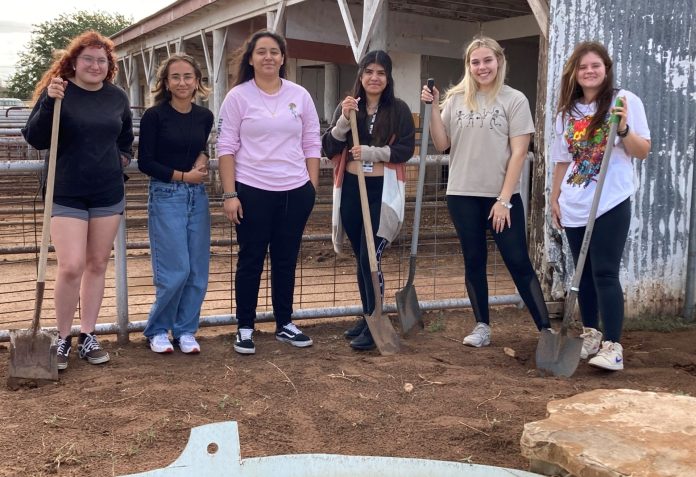
Students in the Ector County ISD’s agriculture program are building an Aquaponic Pond funded through a $3,347.08 Education Foundation grant awarded to agriculture teacher Christina Butler.
Aquaponics combines hydroponics (growing plants without soil) and aquaculture (raising fish and other aquatic animals), according to the Go Green Aquaponics website.
Butler said all of her students are going to be involved with the pond.
“We originally needed a new home for our ducks that we already have. We thought that would be a good idea to be able to implement the project into our classes and get the ducks a new home. That’s kind of what we’re doing with it. It just kind of so happens that it would be involved with all of our classes, too,” she added.
Butler said she thought about the opportunity of creating the pond because they had the area already.
“… I just looked into different options for what we could create for our ducks to be able to have a living area, but also for the students to be able to be hands-on with it and project-based. …,” she added.
They currently have three ducks, but Butler said people in the community get ducks and then realize they don’t really want them, so the agriculture farm takes them in.
“That’s … why we have three ducks already,” she said.
The pond will also free up more room in the chicken coop.
Butler said there was already an aquaponic tank from the old greenhouses that they repurposed.
“We’re just going to build off of that,” Butler said.
There are about 200 students in the agriculture program.
“It can impact all of them. All of them can benefit from it and all of them can learn from it,” Butler said.
Teagan McKibben, a Permian High School senior, Lily Collier, a PHS senior, Crystal Rodriguez, a senior at Odessa High School, Tatiana Veloso, a senior at PHS, Autumn Shelton, a PHS senior, Lucy Gerbera, a PHS senior, are all in Butler’s practicum.
“Those are my practicum kiddos and they’re out here on the farm instead of going to the vet clinic. They are just implementing job skills and tasks out here on the farm to make the farm better and beautify our farm a little bit. They’ll be the ones actually constructing and building the duck pond once we get all the material,” Butler said.
A lot of the equipment will be ordered from Amazon, but there are other items that they already have.
Butler said being in ag class gives students a chance to be in FFA as well so they can show animals and be involved in different contests.
The animals and the environment have kept the students interested in agriculture, they say.
Butler said she would encourage other teachers to apply for Foundation grants.
“… It was a pretty easy process; pretty self-explanatory. They made it … really user friendly,” she added.
The project has to be project based and student based.
“With ag there are a lot of things out here that we need, but it needed to be student based. It needed to be able to benefit the classroom and students,” Butler said.
Eventually she hopes to be able to grow fruits and vegetables hydroponically.
Hydroponic is water based. There are no animals or fish involved.
“Whereas our project is going to be aquaponic where we are the animal and the fish and the feces is the one that’s helping get the nutrients to the plants,” Butler said.
With hydroponics, you have to find the vegetable or the plants that will tolerate water because some won’t grow in water … with just the roots.
“They would need soil, too,” Butler said.
Collier said she feels better that the project is making use of an unused area.
“The students being able to help design it has definitely helped give the kids ownership,” McKibben said.



